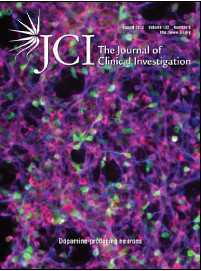JCI:揭示功能相反的基因促使前列腺癌恶化的分子机制
2012-08-10 T.Shen 生物谷
近日,来自范德比尔特英格拉姆癌症中心的研究者通过研究揭示了两种蛋白扮演的角色完全相反,一种蛋白质可以促进癌症发生,另外一种可以抑制癌症发生,然而在前列腺癌中,这两种蛋白质可以调节相同的一系列基因表达。相关研究成果刊登在了近日的国际杂志Journal of Clinical Investigation上。 研究者使用小鼠模型来研究涉及前列腺癌的分子路径,研究者Anderson使用基因组学技术来理解
近日,来自范德比尔特英格拉姆癌症中心的研究者通过研究揭示了两种蛋白扮演的角色完全相反,一种蛋白质可以促进癌症发生,另外一种可以抑制癌症发生,然而在前列腺癌中,这两种蛋白质可以调节相同的一系列基因表达。相关研究成果刊登在了近日的国际杂志Journal of Clinical Investigation上。
研究者使用小鼠模型来研究涉及前列腺癌的分子路径,研究者Anderson使用基因组学技术来理解缺失肿瘤抑制蛋白NKX3.1如何促进前列腺癌的发生。NKX3.1是一个转录调节子,其可以结合至某些基因上影响这些基因的表达。这个基因就是在人类前列腺癌中常见的缺失基因。Anderson分离了NKX3.1的蛋白质,并且鉴定出了9817个基因可以与蛋白质结合,其中282个基因可以受NKX3.1蛋白质来调节,当NKX3.1缺失后,这些基因就会异常表达。
使用生物信息学工具,研究者发现了NKX3.1调节基因的四分之一都可以被抑癌基因Myc来结合。以前的研究结果证实在前列腺癌中,NKX3.1的水平下降,而Myc的水平上升。
研究者构建了前列腺癌小鼠模型,然而,仅仅缺少NKX3.1的小鼠可以发展为早期前列腺癌,但是疾病不会继续恶化。研究者预测,另外一种遗传突变或许对癌症的发展至关重要。当然了Myc就是其中很有可能的一个机制。
因此研究者McKissic构建了NKX3.1缺失,但是Myc高表达的前列腺癌小鼠模型,发现这种小鼠可以发展为晚期前列腺癌。
为了研究其临床关联性,研究者分析了来自前列腺癌病人的遗传和临床数据,发现这些靶位基因的高表达和肿瘤的复发恶化直接相关,尤其是一些靶位基因的抑制或许可以预测肿瘤的恶化程度。后续研究者们会继续深入研究来阐明其具体的机制
编译自:Proteins May Point Way to New Prostate Cancer Drug Targets

doi:10.1172/JCI58540
PMC:
PMID:
Nkx3.1 and Myc crossregulate shared target genes in mouse and human prostate tumorigenesis
Philip D. Anderson1, Sydika A. McKissic1, Monica Logan2, Meejeon Roh1, Omar E. Franco3, Jie Wang1, Irina Doubinskaia1, Riet van der Meer1, Simon W. Hayward3,4, Christine M. Eischen1,4, Isam-Eldin Eltoum5 and Sarki A. Abdulkadir1,4
Cooperativity between oncogenic mutations is recognized as a fundamental feature of malignant transformation, and it may be mediated by synergistic regulation of the expression of pro- and antitumorigenic target genes. However, the mechanisms by which oncogenes and tumor suppressors coregulate downstream targets and pathways remain largely unknown. Here, we used ChIP coupled to massively parallel sequencing (ChIP-seq) and gene expression profiling in mouse prostates to identify direct targets of the tumor suppressor Nkx3.1. Further analysis indicated that a substantial fraction of Nkx3.1 target genes are also direct targets of the oncoprotein Myc. We also showed that Nkx3.1 and Myc bound to and crossregulated shared target genes in mouse and human prostate epithelial cells and that Nkx3.1 could oppose the transcriptional activity of Myc. Furthermore, loss of Nkx3.1 cooperated with concurrent overexpression of Myc to promote prostate cancer in transgenic mice. In human prostate cancer patients, dysregulation of shared NKX3.1/MYC target genes was associated with disease relapse. Our results indicate that NKX3.1 and MYC coregulate prostate tumorigenesis by converging on, and crossregulating, a common set of target genes. We propose that coregulation of target gene expression by oncogenic/tumor suppressor transcription factors may represent a general mechanism underlying the cooperativity of oncogenic mutations during tumorigenesis.
本网站所有内容来源注明为“梅斯医学”或“MedSci原创”的文字、图片和音视频资料,版权均属于梅斯医学所有。非经授权,任何媒体、网站或个人不得转载,授权转载时须注明来源为“梅斯医学”。其它来源的文章系转载文章,或“梅斯号”自媒体发布的文章,仅系出于传递更多信息之目的,本站仅负责审核内容合规,其内容不代表本站立场,本站不负责内容的准确性和版权。如果存在侵权、或不希望被转载的媒体或个人可与我们联系,我们将立即进行删除处理。
在此留言








#JCI#
17